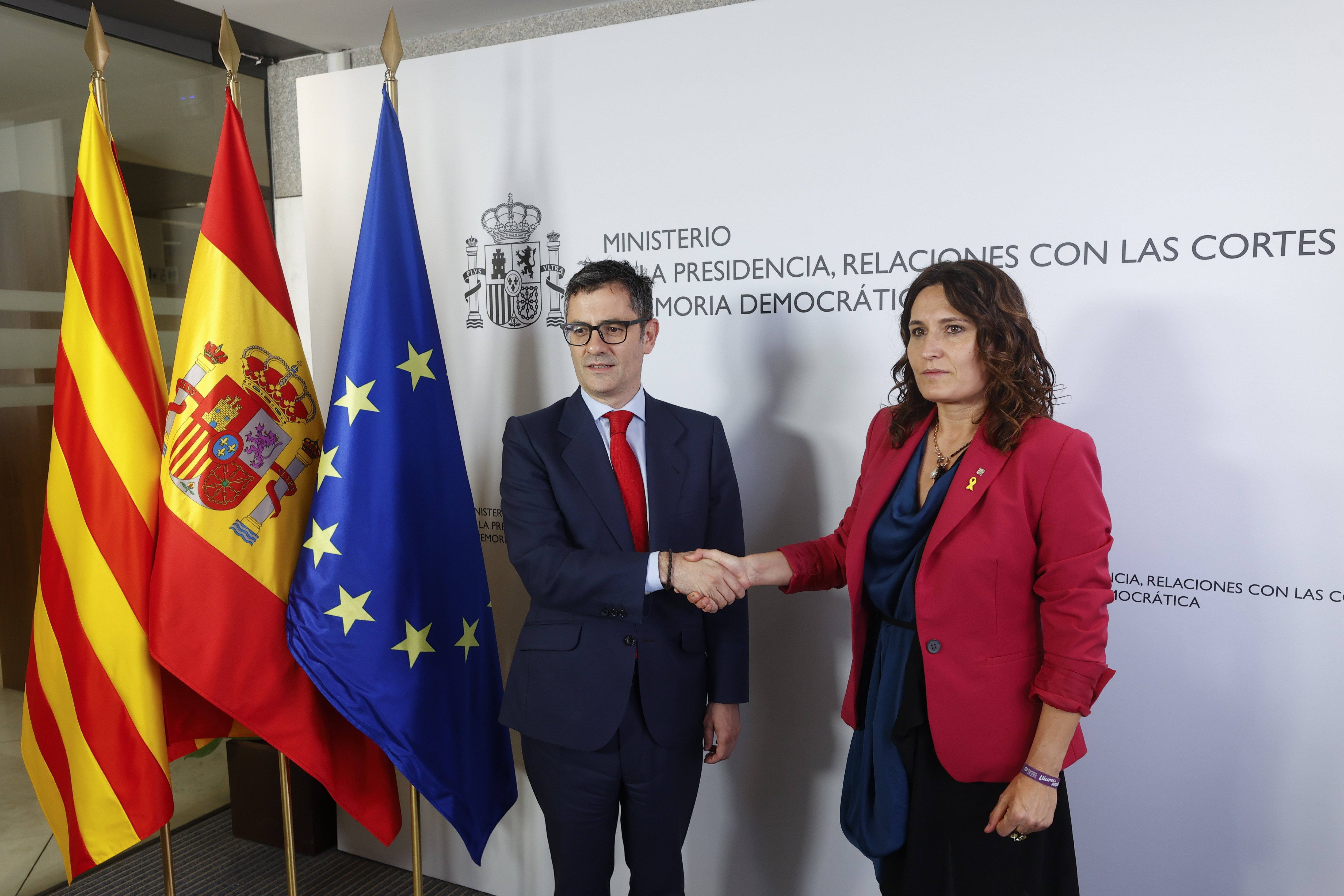This afternoon's meeting between Catalan presidency minister Laura Vilagrà and her Spanish counterpart Félix Bolaños began at five past four in the afternoon. Bolaños went out to receive Vilagrà at the door of his ministry in Madrid, and both of them worked hard to make the pre-meeting photo into a graphic image of the climate which each wanted to convey. That is, the Catalan government representative tried to avoid her perennial smile while Bolaños tried to imprint an expression of cordiality on his usually expressionless face. After more than two hours of meeting, Vilagrà explained that she had demanded "guarantees" from the Spanish government before the broken bridges between the two administrations can be rebuilt. She said that there was still no talk of thawing relations, but also admitted that a first step had been taken today and announced that they had already agreed on a meeting of the leaders, president Pere Aragonès and prime minister Pedro Sánchez, before the summer. When her Spanish interlocutor Felix Bolaños spoke separately later in the evening, it was almost as though he had been at a different meeting: in a more upbeat exposition of the encounter, "dialogue" was clearly the word he used most.
It had been previously agreed that each would give separate press conferences. Vilagrà's main conclusion, speaking at the Catalan government delegation in Madrid, was that they had agreed to "work on these guarantees and new conditions of minimum confidence", which had to be materialized in "specific actions", because "without trust there is no possible relationship". Among these "specific actions", she referred to the dejudicialization of the politics of the independence process, and expressed concern about the Supreme Court's current judicial review of the pardons to the nine Catalan leaders, also insisting on the need to end the hundreds of cases opened against members of the independence movement, including two government ministers. Vilagrà referred to the report by the Latvian socialist Boriss Cilevičs, approved a year ago by the Council of Europe and evaluated yesterday in this body, recalling that the text calls for the need to end the European Arrest Warrants pursuing the exiled Catalan policitians, to promote a more intense political dialogue and to modify the penal code to reform the crimes of rebellion and sedition.
As for the meeting between the presidents, she pointed out that the intention is for it to be held before the holidays. She said that neither the date nor the place where it was to be held had been specified, but asserted that, for it to be called, some of the guarantees demanded by her government would have to be put on the table. "There is no reason to talk about thawing or normalization because we need prior guarantees to resume a fluid and honest dialogue. We have not talked about normalization yet. I expect results in the coming weeks," said Vilagrà, in addition to insisting that this meeting it was not a new opportunity for the government of Pedro Sánchez, but a "new opportunity in politics".
Symbolic principles
Felix Bolaños delayed his own press conference so as not to clash with the prime minister Pedro Sánchez, who was appearing from Brussels. But when he spoke, it was about dialogue, about investments in Catalonia and the work his government has recently done in responding to the Catalangate espionage. In fact, "dialogue" was undoubtedly the most repeated word by Bolaños during his appearance on Wednesday afternoon. "We have begun work on an agreement that will serve for dialogue and negotiation, which will contain the essential principles to govern the political relations between governments and the working methodology of the dialogue table," he announced.
As expected, these essential principles were entirely symbolic and were focused on dialogue: on the one hand, "the staunch defence of dialogue"; on the other hand, the fact that "Catalonia and Spain need political solutions and agreements" (to the point of making it clear that he does not desire further judicialization); finally, "full respect for all political approaches and positions." At this point he announced the future meeting between the Catalan president Pere Aragonès and his Spanish counterpart Pedro Sánchez, without giving details about the meeting or how the dialogue table would move forward.
Investments and Pegasus
The minister acknowledged that relations between the two executives "had been affected by recent information", referring both to the lack of execution of investments in Catalonia and the Catalangate espionage scandal. Thus, with regard to investments he highlighted "the approval and execution of strategic investments" in the territory. "Investments are increasing. In 2022, the pace of infrastructure execution has increased significantly compared to 2021 (36%)," he said. In fact, he boasted that "in the four years of Sánchez, Catalonia has received almost 40% more resources than in the previous four years under Mariano Rajoy". He gave figures to argue that the arrival of European funds is having "a very significant impact on Catalonia", and went on to assert that in the 2023 Spanish budget "we intend to consolidate this commitment to the economic and social future of Catalonia for better infrastructure, more and better services and more and better employment."
Bolaños did, however, concede "discrepancies" with Vilagrà over the Pegasus affair. Nevertheless, as he explained, he reminded the Catalan minister of the measures that the Spanish government had taken over the Catalangate scandal: the CNI's internal inquiry, the investigation by the Spanish Ombudsman, further measures to clarify the facts: "We would respond to any request from any court for the declassification of documents," he added. He also remarked that the Spanish executive wants to carry out a legislative reform of the law regulating the CNI and to pass a new text that will replace the Franco-era Official Secrets Act. "We want to guarantee once again that democratic institutions act with all the guarantees", he concluded.

